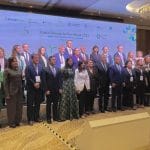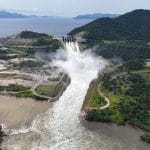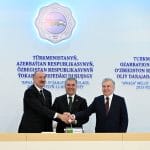EU ambassadors have reportedly agreed to toughen regulations on the Nord Stream-2 on February 8, but they have decided not to back plans that might halt the completion of the natural gas pipeline from Russia to Germany. The European Union is considering amendments to the Gas Directive that would bring pipelines coming into the bloc under EU energy rules.
EU ambassadors reportedly agreed with a Franco-German compromise allowing Berlin to remain the lead negotiator with Russia on the Nord Stream-2.
Katja Yafimava, a senior research fellow at the Oxford Institute for Energy Studies, told New Europe that there has been a proposal agreed by France and Germany on which the vote on February 8 in favour of the amendment was conditioned.
“I understand that the compromise has included clarification that it is an NRA (National Regulatory Authority) of the member state where the first interconnection point is located – rather than other NRAs as well – i.e., the German NRA as far as Nord Stream-2 is concerned – that would be in charge of agreeing arrangements for import pipelines from third countries,” she said, explaining that if the amendment is adopted, the Directive would apply to the German end of Nord-Stream-2, an application for an exemption would have to be filed to Bundesnetagentur (German Federal Network Agency), which could then decide on specific conditions for an exemption.
“As per Article 36 on any exemption, the EC has a final word but, in my view, it would be very difficult for the EC to require a significant and arbitrary cap on Nord Stream-2 capacity utilisation to be part of such exemption,” Yafimava said, adding that on the contrary, the German NRA would be in a strong position not to introduce such cap because it could say that as most of capacity in European gas pipeline link (EUGAL) has been booked under legally binding contracts and neither the NRA nor the Commission raised objections to the “more capacity” procedure under which it has been done, and it closely mirrored draft CAM NC – Capacity Allocation Mechanisms, it must match NS2 capacity utilisation.
“Furthermore, should there be positive judgment on OPAL by CJEU (Court of Justice of the European Union), i.e. allowing Gazprom to use more of OPAL capacity if no demand from third parties – as I would expect – it would strengthen the NRA’s argument in respect of EUGAL,” she said, explaining that all of this does not automatically mean that no cap would be imposed on Nord Stream-2 and there is a reference on Ukraine transit but it makes it unlikely that a significant mandatory cap could be imposed. So one could see the compromise draft as damage limitation exercise as although main threats, i.e. significant arbitrary cap on Nord Stream-2 utilisation, appear to have been alleviated, regulatory uncertainty and danger of litigation remains, Yafimava explained.
On February 4, a non-binding European Parliament’s Committee on Foreign Affairs (AFET) report on the state of EU-Russian political relations mentions again the European Parliament’s opposition to Nord Stream-2. After adoption by the plenary, which expected in March, the Committee position will become an official position of the European Parliament.
Yafimava told New Europe that the European Parliament has long been vocal on its opposition to Nord Stream-2 and it even passed a resolution in December 2018 for the project to be cancelled. However, in November 2018, only 69 out of 751 Members of the European Parliament signed a letter against Nord Stream-2.
“So the European Parliament position appears to be rather fluid but overall it is fair to say that of all EU institutions, the European Parliament is most anti Nord Stream-2. If the AFET report is adopted, for sure it would be symbolically important but it cannot stop the implementation of Nord Stream-2 as the Parliament’s approval (or lack thereof) is not needed,” Yafimava said.
Yafimava reminded that Germany indeed appears to remain a strong backer of the project and opposes the revision of Gas Directive and even if the amendment is adopted, Nord Stream-2 is likely to proceed with construction.
“Overall the amendment is not a good idea as would create significant animosity between the EU and Russia in the gas sector, endanger chances of post 2019 Ukraine transit on a long term basis, open way to significant prolonged litigation, and undermine third countries investors’ confidence in the stability of EU regulatory framework, as clearly the amendment is a clear sign of politicisation of EU regulation,” she said, quipping: “And yet, in the end, it might achieve nothing positive.”
follow on twitter @energyinsider







